- About Us
- Columns
- Letters
- Cartoons
- The Udder Limits
- Archives
- Ezy Reading Archive
- 2024 Cud Archives
- 2023 Cud Archives
- 2022 Cud Archives
- 2021 Cud Archives
- 2020 Cud Archives
- 2015-2019
- 2010-2014
- 2004-2009
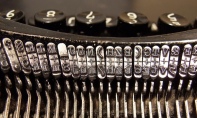 |
Cud Flashes In The Pan |
This Month’s Theme:
“Hot”
While trying to come up with a topic for this month, all I could think about was how hot it was. It’s July. It’s hot in Maine. It’s hot all over the country. (Thanks, global climate change and the humans who perpetuate it.) And “hot” in Maine might sound funny to those who think we live in ice and snow all the time; sure, it doesn’t get as hot here as it does in other parts of the U.S. or the world. But one thing we get here is humidity. I’ll take 105 degrees of dry heat over 90 degrees of wet heat—humidity so high that it feels like breathing bath water. Well, enough complaining; it’s actually not too bad right now, all things considered, and I have the fan running. But man, it’s been some hot. Did I mention that it’s been hot?
“Desert Thirst”
Science Fiction
By David M. Fitzpatrick
He staggered across the burning sands. The sky was impossibly blue, without a single cloud. Twin suns blazed, one rising and one setting. The cruel world would offer just three hours of night; the rest of the sixteen-hour day, he baked constantly.
Sore throat. Dry mouth. Parched lips. Feverish brain. He staggered on. It was getting harder to stand.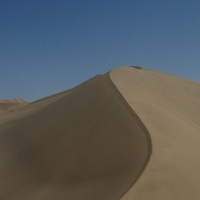
It went on for hours, as usual. He kept scanning the sands ahead, looking for the package. They always appeared, courtesy of the bastard who’d sent him here.
His knees grew weaker. When he finally went down to a crawl, there was still no package. It was the first time in a week of this that he hadn’t found one before falling to all fours. Of course, he was tiring faster now, so probably collapsed earlier than usual.
He crawled for an hour before he saw the package ahead, gleaming in the suns’ light. He crawled faster, like a drunk baby, until he got his prize. He fumbled with the latch on the wooden chest with the steel bands, opened it, hauled out the jug of water. He drank greedily, then rested before digging into the food. He ate, took a break, drank some more. He stayed there until the world went dark, and he knew he had three hours before the first sun rose.
He lay there under the stars, feeling the heat of the sands; they wouldn’t cool noticeably by morning, but the cooling breeze felt good. Through the best three hours on the world, he drank the rest of the water.
He dug the sun lotion from the box and slathered it on, and then went to sleep, knowing that, when he woke, he’d be cooking again.
He understood now what those people in the desert cities were complaining about.
* * *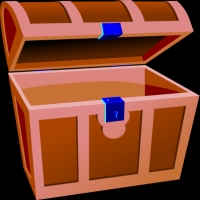
“Why not just kill him?” the wizard asked.
“Not yet,” said the vizier. “If we kill him, the nobles will spend months in a power struggles, which won’t help the people in the desert cities. Another week of this, and you’ll return him; if he’s learned his lesson, he’ll change his decree.”
“Let’s hope so. Those people need water, and it’s the king’
s responsibility to provide for them.”
“it would be nice if you could use that magic to make it rain there.”
“Magic is about energies and portals, vizier. Not the mythical magic where anything can be done.”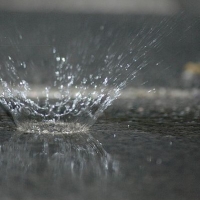
The vizier nodded. “I know.”
“If the king ever discovers it was you and I who did this…”
“He won’t.”
* * *
The king woke. Twin suns burned down on him.
He’d survive somehow. His enemy clearly didn’t want him dead. Yes, he knew how those thirsting in the desert cities felt. But it only enraged him. They were trying to force his hand, but it wouldn’t work. He’d escape his desert prison, and make them pay. He’d have his wizard destroy them all with blasts of raw power.
Force his hand, would they? Not likely.
“Why Are We Walking on the Sun?”
Science Fiction
By David M. Fitzpatrick
“What happens if the dome breaks?”
William looked at his teenage son and smiled. “It won’t. The Sun would have to go nova for that to happen.”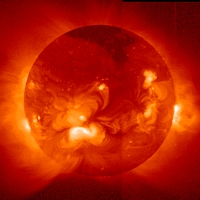
They stood at the edge of the platform, where the clear dome joined the gray base. Outside, the photosphere of the Sun on which the platform floated was visible. The light was brilliant and beautiful, like nothing the father had ever imagined. It was cool and comfortable in the safety of the dome.
“We aren’t we blinded, being this close?” Ben asked.
“The dome protects us. Dims the light, and blocks the heat and radiation. Otherwise, we’d burn up in an instant.”
“How hot is it?” Ben was staring at the photosphere with less a sense of awe and more one of curiosity. William was surprised at this; Ben wasn’t much into the sciences, always writing poetry. William couldn’t imagine anything more poetry-inspiring than sitting on the surface of the Sun.
“Nearly six thousand degrees kelvin,” the father said. “But that’s nothing. The core is nearly sixteen million. And above us, it ranges from one to twenty million degrees. The dome keeps us safe with a dimensional device—the same thing that holds us in place against gravity nearly twenty-eight times that of Earth. Isn’t that amazing?”
Ben chewed on his lip as he stared at the flaring fires outside the dome. Hints of facial hair, somewhere between peach fuzz and beard material, threatened to grow. He didn’t seem amazed. Any poet would be. Hell, any teenage boy would be. This confused William.
They stood for a few minutes, just watching the spectacular show outside in the comfort of the cool dome. Presently, Ben said, “Why are we here? Humans, I mean. Why go?”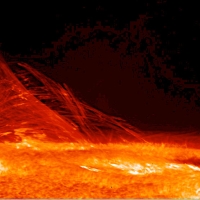
“Well, you know—my job. Studying the Sun. There are always new things to learn.”
“It sounds like we know everything already, if they can build human habitats that float on the Sun. So what’s the real reason to go live on the Sun?”
“I suppose… because we can. Like when we set up colonies to terraform the Moon, Mars, Venus, Titan. We turned those worlds into Earth-like, inhabitable places. We created places for humans to live and grow and expand.”
“Then why the Sun? We can’t terraform it. And we can survive here, but we can’t live here. We can’t go outside and run through green fields and smell life everywhere. We can’t lie under a blue sky and watch clouds overhead and feel cool breezes on our skin. We can’t swim in rushing rivers or feel the cold of a salt ocean. We can’t watch animals in distant jungles or fish in babbling brooks, eat popcorn at a carnival or candy at the movies, enjoy a picnic lunch on a beach or steaks in a fine restaurant. Here, there are just a few people in a dome who can only dream about everything else.”
William was stunned. “Don’t you think what you see here is… extraordinary?”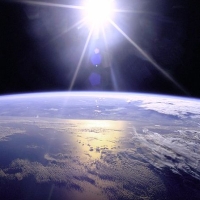
“For a short while. But ultimately it’s just the same old thing forever.”
William didn’t know what to say.
Soon, Ben said, “I’m going back to our apartment. I feel like writing poems about Earth and Mars and Venus and Titan. Lots of poems.
Ben watched him go, then turned and faced the blazing photosphere.
He tried like hell to be amazed by the sight beyond the dome, but he found his sense of awe waning quickly.
And even though he knew, intellectually, the dome absolutely protected them, he couldn’t help but feel uncomfortably hot.
“Fire Devil”
Superhero
By David M. Fitzpatrick
It was one of those improbable things that only happened in comic books—the wrong mix of chemicals, a runaway power source, and an associated experiment on a bizarre meteorite in the lab next door. Either way, the resulting explosion did strange things to Larry LaFlamme—skin demon red, eyes blazing yellow.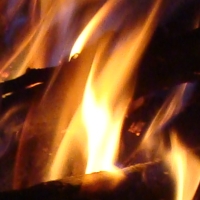
It only figured that he’d end up with superpowers. After all, his name was a giant superhero cliché. It was alliterative, like so many heroes—Peter Parker, Clark Kent, Silver Surfer, Guy Gardner, Wonder Woman… the list went on. And his last name meant “the flame,” so no surprise with the powers. He quickly discovered he was impervious to heat and fire, and soon learned he could generate fire from his hands, like built-in flamethrowers. Experimentation proved he could point his palms down, turn up the fire generation, and fly like a rocket.
He realized he’d finally get people to respect him: he’d become the world’s first superhero. He developed a fireproof costume, its cowl including a mask and stylized horns. He called himself Fire Devil and headed out to fight crime.
His very first adventure was rescuing children from a burning building. Seemed easy enough, until he caused third-degree burns on the kids he rescued. That didn’t go over well. People were furious with him.
His next stint was a hostage situation in a house; some intruder went nuts and was holding the family. Fire Devil managed to set that house on fire and, while the intruder died, the family was pissed at the loss of their home. They sued the mysterious hero, and there were calls to arrest the vigilante.
When he tried to lift a tanker truck that was dangling off the edge of a bridge and ignited the leaking jet fuel, the resulting explosion took out the bridge. Six people died. Twenty more were horribly burned. And now there were warrants out for his arrest.
It made Larry’s blood boil. All he wanted was the attention and respect he deserved—couldn’t everyone see he was trying, and didn’t mean to hurt anyone? What did he have to do to earn their admiration?
And that’s when he realized he wasn’t meant to be a superhero. He was meant to be a super villain. If he couldn’t earn their respect through heroic deeds, he’d enslave it through his incredible power—he’d scorch the Earth until they begged him to lead them!
He burned the White House and the Capitol. He blasted the tanks they sent with explosive fireballs. He batted fighter jets out of the sky with pillars of fire. And he enjoyed it. The best part was that he seemed unstoppable—and, as the only superhero, they’d never be able to stop him.
That’s when he was hit with the terrible cold.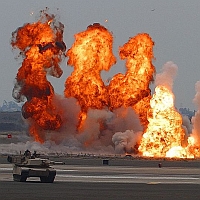
* * *
He woke in a small metal room. There was no visible door, no windows—just small ventilation holes. Fire Devil let loose with a storm of hellfire, blasting the walls, the floor, the ceiling, screaming to be released. When nobody responded, he cranked up the heat and really let loose with his fiery powers, trying to melt the metal. But nothing worked.
He finally gave up, panting with exhaustion—and, the first time since the accident had transformed him, he felt hot.
“Getting warm in there, Fire Devil?” came a voice over a hidden intercom.
Fire Devil struggled to his feet. “Who is that?”
“A kindred spirit. Call me… call me Polar Bastard. That was quite a show of supervillainry you did, by the way. I was impressed—but your world-domination plans conflict with mine.”
“What?” Fire Devil cried.
“You’re not the only one who suffered a freak accident and gained super powers, you know.”
Of course, Fire Devil realized. These things happened often in comic books.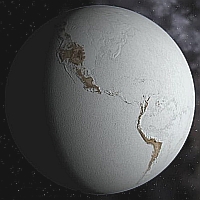
“But my powers are the opposite of yours,” Polar Bastard continued. “Mine are cold-based. I plan to encase this planet in ice and enslave the survivors.”
“Then free me!” Fire Devil cried. “You’ll freeze, I’ll burn—together, we’ll be unstoppable!”
“Sorry, friend, but I can’t take the chance you’d return to being a do-gooder and thwart my plan. But I’m curious as to what your limits are.”
Of course. In the comics, the villains never just killed the heroes outright.
“That room is super-shielded,” Polar Bastard said. “It’s heating up solely due to the heat your body emanates, Fire Devil. Eventually, even you’ll reach your limit.”
Steam sweated steadily out of Larry’s pores.
He realized this wasn’t a comic book. He was going to cook himself and die here.
All they had to do was thank him, admire him…
Steam sizzled off him like water in a frying pan.
“Burning Apocalypse”
Science Fiction
By David M. Fitzpatrick
Major Jack Calloway was alone in his ship, having just emerged from a wormhole to study the Bastion Nebula up close and personal. He'd bring some great data back to Earth next year.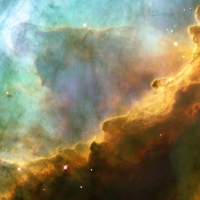
He flew into the nebula, checking the photo of his wife and daughter that was taped to the left side of the cockpit controls. To the right, just at his periphery, dangled two oversized fuzzy dice, a gift from his daughter. "So you have something to do," she said, "while you're out in space all alone."
He spent the next week hyperjumping around the nebula, taking readings, photos, and video, before he found an unexpected surprise: a planet, deep in the heart of the nebula. It was a rogue planet, traveling through without being gravitationally bound to a star, but quick readings showed it was locked in place inside the nebula due to some impressive Lagrangian points formed by nearby stars and a black hole. The planet basically meandered on a roughly circular path inside the nebula, without a sun. To boot, the thing had several small moons. No such planet had ever been discovered before, so it was worth investigating.
Calloway took his ship in for a landing, through the atmosphere and down over stunning mountains. The sky was a rainbow of nebulaic colors, and occasional volcanoes told him the world heated itself from within, probably aided by the gravitational tug of the many small moons. Everywhere, the air was heavy with steam.
The planet seemed devoid of life, though, but he found a broad plain to set down on. He got into his spacesuit and exited the craft. The suit protected him; it was nearly 300 degrees on the surface.
He hadn't walked two hundred feet when the whole world seemed to shake. Lightning bolted down from the sky, impacting around him, and a massive fissure opened up behind him—between him and the ship. Smoke and ash spit from the crack, and magma bubbled up. And from inside the fissure, a massive hand appeared, and then another, and then a black creature, looking as if carved from obsidian, clambered up out of the earth and stood towering above Calloway. It was roughly biped, but hulking and twenty feet tall. Burning yellow eyes glared down at him. Hot fissures glowed bright red between its joints.
"You have invaded our world and our nebula,” boomed the creature’s voice. “Tell me why we should not kill you."
"I'll leave peacefully," Calloway said. "I didn't realize this was an inhabited world."
The thing seemed to study him for a moment. "You are a puny life form," it finally decreed. "We destroy all who come here."
"I'd rather you didn't," Calloway said. "Please—I have a wife and daughter back home, and I love them very much. They wouldn't do well with my death."
The thing seemed to think. "A procreative life form, with DNA?" It laughed, loud and deep. "Puny indeed, and with such brief, limite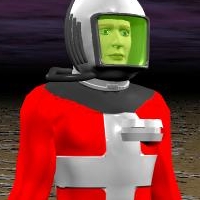 d lives. A tragedy. However, I will give you the chance to survive and return home. Tell me what these are."
d lives. A tragedy. However, I will give you the chance to survive and return home. Tell me what these are."
And in a flash of light, Calloway was back in the cockpit of his ship. Standing with him was the creature, only just six feet tall now. It extended a black arm, red joints glowing, to point at the fuzzy dice. "What purpose do they serve?"
So Calloway launched into an explanation of dice, and how they had been used in some form on Earth for thousands of years—how the numbers rolled meant different things depending on the game. The beast seemed intrigued.
"We shall roll these dice," it said. "If you roll the highest total, you go free. If I roll the highest total, I will destroy you."
"Do I have a choice?" Calloway said.
"No. But I warn you—you will not cheat. Follow the rules and remain honorable."
Calloway nodded. "Let's get started."
He pulled the fuzzy dice down and tossed them to the floor. He came up with a two and a five. "Seven," he said.
The beast held out his rocky palm and caused the dice to levitate; touching them would likely have burst them into flames. He flipped the dice into the air, and they bounced and settled on a three and a four.
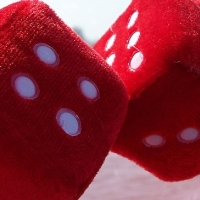 "Tie," Calloway said.
"Tie," Calloway said.
The beast growled. "Roll again."
Calloway tossed a one and a four—too low for his comfort. But the beast rolled a two and a three for a second tie.
"I grow weary," the beast said, "so I am amending the rules: a tie results in a win for me."
"That isn't right!" Calloway exclaimed. "You talk of being honorable, but that isn't honorable."
"But they’re my rules," the beast said. "I shall roll first."
The dice hit the floor: a pair of sixes. The beast growled, and Calloway snatched up the dice eagerly. He just had to not roll the same.
He let them fly—and came up with a one and a five. He whooped in celebration. "I believe that means I can leave," he said.
"So be it," the beast snarled, smoke pouring thick from its joints. "But know this: I shall let you live, but we will soon follow you through your wormholes until we find your home world, which we will utterly destroy!" And he laughed, long and loud, and Calloway looked stunned.
"We're no threat to you!" he cried. "You talk about honor, but you continue to be dishonorable."
"My rules," the beast said. "Now, leave here before I change them yet again."
***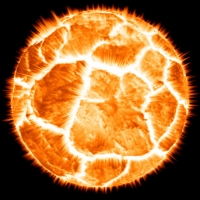
Calloway broke orbit from the hellish sauna world, even as the spot where he had been on the planet began to glow bright red—undoubtedly, the creature preparing to follow him.
"So much for honor," he said to himself, and flipped up the firing controls. He activated the antimatter bomb and released it, even as he kicked in the accelerators and rocketed away.
A minute later, the bomb impacted with the world and there was a tremendous explosion. The planet was completely obliterated. A million miles away, Calloway felt the intense shock wave.
He hated having to do it, but the beast had left him no choice.
"So much for honor," he said again, and raced off through the nebula.
David M. Fitzpatrick is a fiction writer in Maine, USA. His many short-stories have appeared in print magazines and anthologies around the world. He writes for a newspaper, writes fiction, edits anthologies and teaches creative writing. Visit him at www.fitz42.net/writer to learn more.
